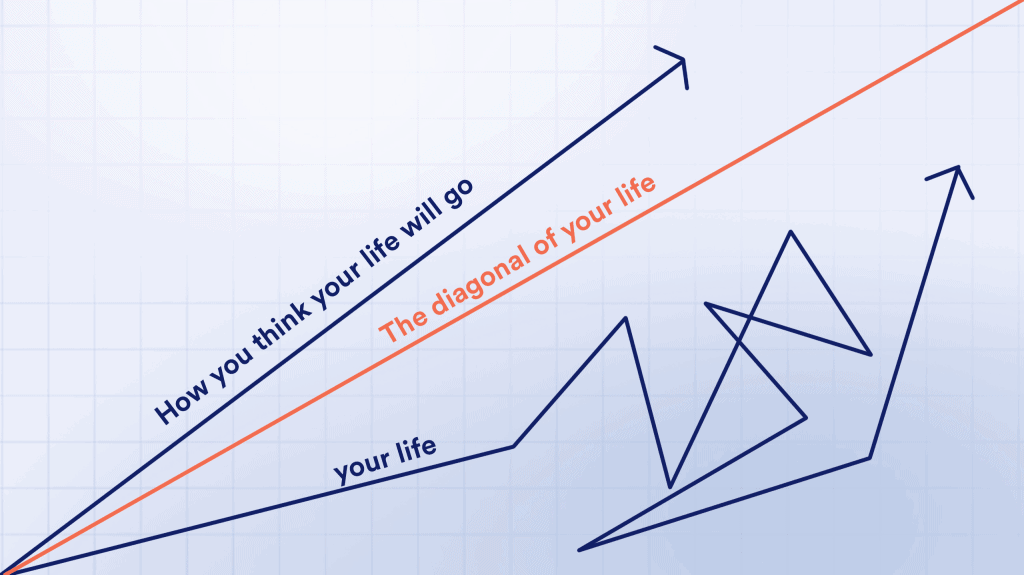
Jan 09, 2025
- Mindset
If I may offer something that helped me:
The diagonal of your life:
Stop trying to wrestle your life into submission.
Focussing on the end results and struggling harder will just result in burnout.
Set a general direction, create habits which steer you in that path,
but let go of controlling the exact trajectory.

Here’s a few tools which helped me:

I feel like I don’t have the qualifications. Like I don’t really know what I’m doing. I’ve never worked for a company doing any of the things I offer. I see plenty of people who are successful with less qualification than me, but I also see a lot more. I guess I’m comparing myself. – Alana, webflow designer
As someone who’s burned two degrees, qualifications are overrated!
Best to learn is by doing.
Sometimes that means selling stuff you are not sure how to do yet.
But you’ll figure it out!
It feels uncomfortable and scary, which is never nice but that uncomfortable feeling just means your in the growth zone.
It’s easy to compare yourself to others If your on social media you can’t avoid it.
But remember everyone has their own pace,
And most of the stuff you see on social is the cherry picked highlights anyway.
It’s always hard then you get a little win which gives you the energy to keep at it.

Good question. It’s a complex topic.
It spans pricing freelance services, and more abstract notions of self-esteem
I usually use value-based pricing.
So it depends on what the customer is getting back from the interaction
Vs what I have to do to fulfil the promise.
In my design agency it’s easier as you are offering services that make people money.
So I can price based on how much money they can make from my help.
It’s usually easy to do some napkin sketch math on this depending on the services or products they sell and the number of customers they have vs the no of customers they will get.
This can be a lot or a little, depending on the business.
In LBD it can be trickier.
A lot of coaches just teach stuff to help you make more money.
But my whole programme is about realising that money means little after a certain point,
And helping people to build the kind of lifestyle that they want,
And organising their business around freedom first.
So the stuff I teach has benefits which I feel are more valuable than just money,
But are intangible and harder to define.
Things like
Different people place different value on different things.
Phase 1 is about lifestyle design for freelancers. It’s about designing the ideal lifestyle for that person, and reverse engineering it into actions they can take daily, and providing them with systems for consistency to make sure they take those actions whilst avoiding overwhelm..
Intangible stuff. But this is the foundation growth (both personal and business) is built on.
Phase 2 is stability. This part of programme deals directly with helping freelancers increase their profit, for a safety cushion and stable income,
So if in doubt I can relate the value of my services back to how many clients they will gain, how much more money the can get by increasing their prices
Phase 3 is about freedom. systems to help freelancers automate the fundamentals of their business so they can spend their time working ON the business, and get back their valuable freedom.
The end result is a scalable lifestyle business built around an intentional life.
Which I think is pretty valuable.
Everyone will do these mental calculations in their head when they meet you.
The calculation is a balance of the result, your authority, your trustworthiness, what people are willing to pay for that result.
In the end,
Your price is how much OTHER people think you’re worth 🤣
Your worth is how much YOU think you’re worth.
Your value is how much your product pays off.
For myself, I try to tie my worth based on people I’ve helped and what they say about how I’ve helped them,
Not how much money I make.
I fear a lot of people never disconnect income vs self-worth
If you can start judging your worth for yourself, instead of what others think.
It makes your self-esteem more sustainable.

Truthfully, I don’t!
I sometimes feel I have two versions of myself perched on each shoulder:
One is endlessly ambitious and hungry and pushed me further.
The other just wants a simple life with free time.
It can be a rollercoaster actually balancing your ambition and contentment
I’ve come to realise that for certain types of people, there is no permanent balance.
Focus requires letting some things slip.
You can’t achieve great work or lasting peace without letting some things slide.
So you have to decide what the priority is right now, and adjust on a regular basis.
You can let most things slide for a while, and pick them back up later when the time is right.
I’ve written more about my battle with balance here 👇🏻

I’m a terrible overthinker.
Sometimes it’s a superpower, which helps you brainstorm ideas
But often it’s a crutch which has you cycling through the same problem over and over with no progress.

Hey **** sorry to hear that man. I’ve been through that myself before.
Sometimes it can feel like the todo list is crushing down;
That it’s impossible to to even the smallest tasks;
That you’re making no difference or progress.
That everyone else is doing better.
This is normal. We all feel this way sometimes. Some to greater or lesser degrees than others.
I’m no therapist.
But here’s what worked for me:
If you’re an introvert, overthinking & talking therapy won’t help you.
Follow the stoics:
Pull yourself out bit by bit,
By stacking momentum,
By finding purpose,
And by losing yourself in the doing of meaningful work
From what little knowledge I have from what I’ve read, and from talking to people who have done “talking therapy”, it involves a lot of analysing your thoughts,
which for some can lead to a deeper hole of introspection, inaction and inertia.
Understanding your feelings doesn’t make them any easier to deal with.
In fact in some cases it only validates your bad feelings more.
From my own experience, Stoicism will help you a lot.
Stoicism teaches us to acknowledge that we feel shit, recognise that feeling shit is just a feeling that we are feeling right now,
and we can act regardless.
Stoicism teaches us to recognise but control our feelings so we can change our behaviour despite our feelings, allowing the more logical part of our brain to take over.
Which is far more appealing to me.
I don’t want to be a victim of my thoughts, I want to be an agent of my own life, even if it feels shit right now.
Everyone is different.
There’s no one magic bullet.
But there are lots of small things you can to do to steer yourself back to stability.
So here’s what’s helped for me:
In my opinion, depression is remarkably similar, sometimes indistinguishable, from burnout.
The symptoms are similar;
The difference is depression is often inexplicable whereas burnout has definitive triggers.
Here are some articles about burnout that might help you:

Your brain isn’t meant to hold lots of ideas, it’s stressful.
Create a place to dump all your thoughts and notes ( I use Clickup, it’s great, here’s a referral link with a discount)
Note down all your big picture tasks and todos
sort them by importance.
Set aside a bit of time each day, every day, to work on them.
Little and often is better than grand gestures.
Make sure it’s realistic so you stick to it.
Half an hour first thing every day is better than taking a week off then giving up on it.


I wouldn’t quit without a secure income lined up, but I wouldn’t wait to start sidehustling either.
Many people are already freelancing and side hustling.
The two aren’t mutually exclusive.
If you’re are torn between wanting to quit and being able to quit,
you don’t want to be in a position where you’ve got to start growing a side-hustle from scratch.
You can make a huge difference in six months to a year, but obviously, as with anything, the change is a trajectory.
You want to start growing your sidehustle as soon as possible.
Give yourself options:
If you’re torn between wanting to quit and being able to quit,
you don’t want to be in a position in four years where you’ve got to start growing it from scratch.
If you find yourself in this situation,
then it’s going to take you years,
you will have to work a job you don’t enjoy,
and you’ll feel pretty bad about it
If you find yourself in this situation, then it’s going to take you years, you will have to work a job you don’t enjoy, and you’ll feel pretty bad about it.
I worked long hard for years plus evenings and weekends,
and even then for almost a decade my side-hustle made almost zero money.
Real success is just consistency + time.
During that time were a lot of difficult choices,
a lot of second guessing,
a lot of agonising.
Set aside time to work on your sidehustle everyday and keep consistent.
It can be boring and hard and slow but that’s what’s required if you want to build a new life.
So I would say the earlier you can start growing your side hustle, the better.
If you can grow your side hustle to where you are earning as much as your full-time job and you don’t need the work.
It puts you in really the ideal position to quit, while still having a secure income
So don’t quit unless you’re ready,
but don’t wait to grow your sidehustle!

Hey Ivan, great question!
So it didn’t happen overnight, it was an organic progression for me over many years.
I’ll break down my journey for you:
This is going to be pretty much off the top of my head, unedited and unembellished.
Since I was a teen, I have always designed things as a hobby.
This turned into a sidehustle, so I’ve always done my freelancing I guess.
It earned me some extra pennies while I was studying at university.
Later as I went into the world of work I kept doing it as it added to my income. It never made much money, sometimes as little as £500 a year.
For most of my life it was not enough to sustain me as a career.
This is something most gurus online don’t talk about. People aren’t honest about it on social media:
Every time I see a post where someone claims to have quit their job, started freelancing a years ago and now they earn £10k/m,
I want to shout:
“Did you, aye? BOLLOCKS!”
It’s a harmful myth that makes people feel crap about where they are.
We all have different starting points, different responsibilities and advantages/disadvantages.
But the truth is if you want you grow your own business, if you want true freedom, if you want to escape the ratrace…then it takes many years of working hard for little reward.
Most people aren’t willing to work hard for no return for a few months, never mind a few years.
Every “overnight success” you see is just action + consistency + time.
It took almost 10 years for my side-hustle to earn enough money to sustain me.
Every year, my clients, and my earnings, grew tiny bit by bit. Eventually, it reached a point where I started to glimpse it as a full-time income.
I remember during lockdown I was officially furloughed, but unofficially I was expected to work on the sly.
Around this time I think everyone had their “great awakening” and we all had a glimpse of what life could be, outside the status quo of the commute, the 9-5 etc.
A lot of people had no work to do whatsoever. For months! This blew my mind!
I watched people go nuts. People were drinking more, bored out their minds, addicted to Netflix.
But they also had time with family. Time to get outside during the day and walk in nature.
At the time I resented the fact that I had to work, but in hindsight I think it actually saved me.
I’m not made to be idle. I don’t think anyone is.
So with a little more spare time, I started reading books by the masters of lifestyle design:
Tim Ferris’s 4 hour workweek, the 80/20 rule, the compound effect, Hell Yeah or Hell No, Free Time and more. you can check out my reading list
I read every day, I read like a mofo, and then I read some more.
This opened my eyes to what is possible.
Most people aren’t even aware of what is possible with the right knowledge.
Read every day for 6 months and you won’t even recognise yourself.
Apply what you learn every day for 6 months and you won’t even recognise your life.
Reading opened my eyes.
I became dissatisfied with the idea of working a 9-5 the rest of my life, of being underpaid, undervalued, constrained in my hours and actions.
It no longer seemed tolerable.
At that point I thought; “if I can just get x2 clients a month at 1k each I could quit”.
It lit a new fire in me, and I remember calling up enquiries on the way to and home from work, and designing logos for £120 on my laptop on park benches during lunch breaks, my hands were so cold I could hardly work the mouse.
I was working pretty hard. I think this is a necessary stage in growing your side-hustle into a career.
But it’s not sustainable. Eventually caught up with me in a big way…
My boss found out I was side hustling and he didn’t like it.
I never hid Design Hero, but I never shouted about it either, for obvious reasons:
Most bosses don’t like their employees to have their own motivations and aspirations outside of the job.
Most bosses expect employees to be 100% loyal and dedicated to putting more money in the company’s pockets, instead of helping themselves first.
But loyalty should work both ways; I was underpaid for the number of roles I was filling;
I was a web designer, coder, project manager, social marketer, SEO and more.
I’d been promised multiple raises, commissions etc for a while, which never materialised, I was getting pretty fed up of waiting already was watching my Design Hero income.
I started wondering if I could make the leap to full-time freelancing.
Then fate made the decision for me:
Some of my work won some awards, I posted it on LinkedIn. My boss found out about Design Hero.
At the time I was working remote from home, and I made the fatal mistake of calling an enquiry for Design Hero during work time.
It was my failure and I shouldn’t have done it. I failed to maintain a proper separation between work and my sidehustle; something I was normally very strict about.
I justified it because I often worked late and overtime for my 9-5. I never asked or expected to be paid overtime for this, working hard is just part of who I am. So I didn’t see any harm in swapping the time and making it up later.
But it was a conflict of interest, he found out and fired me on the spot.
I don’t blame him, he was a nice boss, he was hurt as he felt betrayed and that I was living a double-life. He wasn’t wrong!
I was working full-time and working my side-hustle on evenings, weekends and even lunch breaks. My heart was with Design Hero rather than my full time job.
So he did me a favour and forced me to make the leap.
Looking back now, as a boss myself, I think it’s naive to think that people who work for you won’t also work for themselves.
This is even more true now as living costs outpace the rate of pay.
There’s a certain type of person who is always learning. Who picks up multiple valuable skillsets. Who takes initiative without instruction. Who questions “Why”? Who stays curious, works hard and outgrows their job title again and again.
If you are someone like this, then most bosses at small businesses can’t afford to pay you what you are due and you’re probably destined for freelancing or solopreneurship.
I try to keep this in mind. If my team have aspirations, instead of trying to stop them, or making them think they have to hide it, I teach them, help them, and advise them.
I see being fired as a turning point where my income took a quantum leap over a short period of time.
Looking back, I think this route gave me an advantage over other designers:
Because my time was so limited I was forced to work differently:
I didn’t have hours to call clients, to chase enquiries, to churn through the admin, to chase invoices.
I had to work smart not hard.
I thought now that Design Hero was my only job I’d have loads of free time.
But it turns out your tasks expand to fill the time you have. It even has a name: “Parkinson’s Law”.
I reached my first £10k/m and I was miserable. I was totally burned out, and maxed on time.
I was working for myself, I’d reached 6 figures, I’d achieved everything I had everything that I’d strived for.
So why was I miserable?
It was a critical realisation for me:
After you have enough, more money won’t make you happy.
This cliche is so commonplace it’s practically gospel.
But it’s one of those one’ you have to experience first-hand to understand.
Many never earn enough to learn this lesson.
It’s a good problem to have. Certainly better than burning all your time to make enough money.
‘Enough’ is different for everyone. But it’s probably less than you think:
I have a theory most folk would be much happier earning £70k/yr on a 3day workweek than £120k+ working 5 days.
After that point, time quickly becomes far more valuable to you.
You’ll find yourself spending what would have previously been obscene amounts of money, just to buy back your free time.
So I built systems, automations, scheduling, templates etc. to 10x the limited time I had.
Every time I did a task I would spend twice as long trying to figure out a way to avoid having to do it again.
This was the foundation that allowed my business to scale without me putting in more time.
1 year after being fired I had periods where I made more in 1 month than my whole annual salary.
Nevertheless, there’s a limit to how much you can grow by yourself…
By that point, I’d spent ten years building websites, and I had to continue to support existing clients, whilst finding new ones to grow my income.
It became so that I was spending more time on support than growth.
So my first hire was someone to help me with small support tasks for WordPress sites.
This I guess is the first step towards an agency:
Moving from doing everything yourself to having help with fulfilment, so you can free yourself up to work on big picture tasks, growth, sales, systemizing your business etc.
By the next year I’d managed to optimize my business down to a 3 day workweek.
I still prefer not to think of myself as an agency owner.
I still think of it as a solo business, but I guess since I do have a small team,
I’d describe Design Hero as a micro agency for startups.
Yet I have to face the fact that I do have a small team under me,
and I spend more time running the business, building systems etc than I do doing design these days.
It’s a new set of skills to learn, new challenges, new problems.
Life is always learning.
In a solo business, you ARE the business.
So personal growth = business growth.
They say being a manager is watching someone take x10 longer to do the job half as well as you would lol.
But as always you have to think super long-term. If you take the time to train, and to teach, with patience, it pays off in the form of more freedom.
I teach every freelancer as if they were a student of mine, and were paying for my time.
I take the time to review, critique and explain everything I do for them.
I record my work, explain my thinking, outline the strategy, the Why, and the Why nots.
I teach the soft skills like client management, policy settings, boundaries etc, all the difficult stuff that they don’t teach you in design tutorials on Youtube.
At this point I had enough money to live comfortably. I had systemized a lot of my business so I also had free time.
At first I used this time for leisure.
I hiked, I played video games, I worked in the garden, I took bike trips, and I even did a bit of lifestyle design;
I looked at my childhood dreams and got into motorsport in a small way. It was a great summer.
But I’m not made to sit still.
I started to feel a creeping anxiousness that I couldn’t explain.
I used the Five Whys to work through it to figure out what I was feeling and basically, I found that I was bored.
It’s like video games: When things get too easy, you get bored.
People need a challenge. So I sought my next challenge and took time to think about my life and what I wanted to do.
I sought something which would give me a sense of purpose, of how I could do something with meaning.
Just as I never set out to be an agency owner, I never set out to be a mentor either.
Teaching my team naturally led into teaching other freelancers.
I was already recording training, doing daily teaching and c oaching to nurture my team’s skills.
My freelancers kept telling me that instead of my paying them, they should really be paying me, just for the stuff I was teaching and mentoring.
I wasn’t fishing for complements, several of them said this unprompted. So I thought there was something in that…
I figured a good way to do that would be to help other freelancers navigate the problems I’d already had.
I was already getting questions on social from freelancers on how to solve some of them.
I repurposed my social accounts for my coaching platform, I write every day about running a multi-six-figure business on a 3 day workweek,
and I share the systems and strategies I use every day in Design Hero.
I write about all the problems I’ve had, how I solved them, and how to do it without getting burned out.
(spoiler alert, I still get burned out sometimes!)
But people get value from the content, they contact me to ask me questions, just like this, and I give them answers freely, and then I ask them if they want further help.
That’s how I got into coaching.
It doesn’t make much money.
But I have enough money, it gives me purpose to help freelancers.
I try not to let it become a business;
I write for the sake of writing and nurture the habit.
I treat it the same way as I did Design Hero when it was still a sidehustle:
Instead of focussing on profit, I treat it as getting paid to learn about coaching, and learn my audience’s problems.
I’ve been helping freelancers solve their problems for about a year now.
They bring me their problems, and I give them solutions that have worked for me, and I check-in to make sure they are working through the problem to a solution.
I’ve noticed they often bring me the same problems, and that they often aren’t aware of what the real problem is.
So sometimes I give them a roadmap and framework to go through to…
So the next step for me is taking my 1-1 coaching and turning the format into a more structured cohort-based course which I’m calling Systemized Solopreneurs;
The goal is to help frantic freelancers redesign their lifestyle, build a 6 figure business around it that puts life first, and systemize it to give them freedom without burnout.
That’s pretty much where I’m at now!
I’m sure there’s more to it that I’ve forgotten, but that’s the broad strokes!
If you’d like help along this journey, reach out for a chat, I’d love to talk to you more about it.


What if the project was more complex than you imagined?
or if you haven’t scoped it properly?
you may get ‘stung’.
In that case, I stick to my guns.
Even if it hurts me.
Because delivering good value and the result that you promised is important.
Holding your promise is more important than almost anything in business.

Your contact details will be private. The answer to your Question will be public so other solopreneurs learn from it.